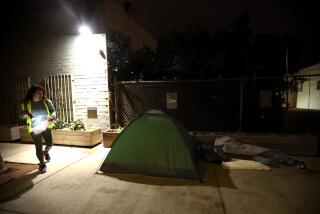Room for rent: Another way to pay the bills
For years, Murat Ekici’s housekeeping business was a success, dispatching crews of workers to scrub the toilets and vacuum the floors of Hollywood stars. But in such uncertain economic times, even Hollywood stars have tightened their wallets. Many of them have cut their weekly cleaning service with Ekici’s company to monthly, then dropped it altogether -- a situation that has had an unfortunate trickle-down effect.
Ekici, 32, and his wife are looking for roommates to help with the $3,800 monthly payment on their five-bedroom home in Eagle Rock.
“It was easier before to cover the mortgage,” said Ekici, who bought the house four years ago. “Now it’s really hard, so we thought maybe we could rent out at least two or three bedrooms.”
But even at $600 per room, with free wireless Internet service, cable TV and access to most of the house, Ekici hasn’t had any takers. In fact, he hasn’t had a single phone call for the rooms in the two weeks since he posted ads on the Craigslist and Westside Rentals websites.
“It’s unbelievable,” Ekici said.
Or, perhaps, it’s too believable. As the economy spirals downward and the foreclosure crisis escalates, more homeowners like Ekici are posting ads and trying to rent rooms as a means of offsetting their expenses. Listings for L.A.-area rooms on Craigslist were up 72% in October from the same period the year before.
“There’s a definite uptick in rooms/shared housing ads on the site,” Craigslist spokeswoman Susan MacTavish Best said. “L.A. is a fairly saturated market, so to see the continued growth in this section is worth noticing.”
At Westside Rentals, which bills itself as Southern California’s largest home-finding service, “A ton of people who’ve never been in the market of renting out rooms are getting into it,” owner Mark Verge said. Listings for rooms are up 25% from this time last year, he said, and “the most dramatic increases are in houses.”
The increase in room rentals is a major reversal from what had been happening just two years ago. From 2003 through 2006, apartment rentals were down because single-family housing was deemed so attractive, said George Van Horn, senior analyst for IbisWorld, an L.A.-based firm that publishes quarterly reports on the rental market. From 2007 on, demand for apartments has been up 3%, and IbisWorld predicts it will continue to rise.
Single-family housing is still attractive, but it can be more difficult to afford -- especially when owners face increasing costs for utilities, not to mention the extras.
Ron Ward has already axed his cable service and stopped charging as much on his credit cards. Still, the real estate agent and electronics salesman wanted to catch a break on his bills, so he put an ad on Craigslist to rent one of the three bedrooms in the Spanish-style Leimert Park house he’s lived in for 12 years.
“I had a friend that had lost his job and was letting him stay with me for a little while, so I said, ‘If I’m going to do that, I might as well get a paying person,’ ” explained Ward, who pays $2,300 each month in mortgage and hopes to charge $775 for the room.
Renting rooms in houses “is something of an underground economy,” according to IbisWorld’s Van Horn. The market has traditionally been seasonal and largely consists of college students and migrant workers, he said, though demand may be shifting to other types of individuals due to “employment uncertainty.”
Michael Tchong, a San Francisco-based marketing analyst, cited an interesting convergence of phenomena. “You’ve got the economy downsizing,” he said. “At the same time, you’ve got an Internet that fosters socialization.” Consider the growing number of single adults in the country too, he said, and “it’s going to be fascinating to watch how this develops, especially if the economy remains in disarray a long time.”
Renting a room can be an intriguing proposition. Many homeowners who are looking for roommates have never been landlords. And their tenants are likely to be strangers.
“Historically, in times of economic crisis, taking in tenants has been an option many families have employed to get extra income,” said LeMar Woolly, spokesman for the Department of Housing and Urban Development in Washington, D.C.. “It also provides a needed community service as many former homeowners who have experienced foreclosure need a decent place to live and can’t afford apartment rents.”
The agency does, however, urge homeowners to check the references of prospective tenants and to contact a HUD-approved housing counseling agency to get advice about state landlord-tenant laws, given that many of the homeowners will likely be new to the rental business.
Ekici of Eagle Rock already expects potentially uncomfortable situations if he and his wife are able to rent out their three rooms.
“I’m Muslim,” he said. “Imagine someone living in your house and they want to barbecue pork. You can’t say, ‘Don’t do that.’ In many different ways, it’s going to be an experience. Is it better to lose your house? No.”
Carpenter is a Times staff writer.
More to Read
Sign up for The Wild
We’ll help you find the best places to hike, bike and run, as well as the perfect silent spots for meditation and yoga.
You may occasionally receive promotional content from the Los Angeles Times.










